- Home
- Joy Dettman
Ripples on a Pond Page 7
Ripples on a Pond Read online
Page 7
Amber had seen those letters steamed open, read, then carefully resealed; had seen Lorna’s dominant red script, Return to sender, written on front and rear of the envelopes, seen them dropped with satisfaction into the letterbox.
Amber chewed and made no comment. No comment was expected.
‘My father left the management of his estate in the hands of cretins. I saw to it that the boy would not inherit until he reached the age of reason, but my father in his dotage – no doubt coerced by those fools – added or wed to his will.’
Amber nodded and loaded her fork.
‘He wed some chit of a teacher at Margaret’s deathbed. Very conveniently timed, and I told him so. He won’t get away with it.’
Amber nodded, feeling a mote of sympathy for the nephew and his chit. She’d seen Lorna at work on many occasions.
LEAVE OF ABSENCE
On the third day of October 1969, on her twenty-fifth birthday, Cara filled in the necessary forms to apply for a three-month leave of absence from the school, through February, March and into April of 1970. Her excuse for requiring leave: Overseas travel, she wrote.
Before October was done, she bought a new refrigerator, a big one. When it was hauled up the flight of concrete stairs and into her dogbox flat, it proved too large for the available space. Her tiny kitchen table and chairs gave up their corner to it; they moved into the sitting room. Carpet beneath the table now, but that was the least of her worries.
Not a lot in the sitting room. Her large desk, typewriter, one battered easy chair, a portable television, and an elderly coffee table.
In November, she bought two typewriter ribbons, a pile of typing paper, pencils and two erasers. Each purchase carried home was ticked off her list before being packed away. A long list, two pages of it, on her kitchen bench beneath the telephone. Before the school year ended, every one of those items would wear a tick.
On a Sunday night in early December, when Myrtle made her usual call, Cara added another tick to her list.
‘I’m flying over to England for Christmas, Mummy. I’m taking a three-month leave of absence from school.’
‘For Christmas. Couldn’t you put it off until after Christmas?’
‘Everything is booked.’
‘Winter is a bad time to be over there, poppet,’ Robert warned.
‘I’m hoping to see a white Christmas, Daddy.’
‘It won’t be the same without you, pet,’ Myrtle said.
‘I’ll be back before you even miss me.’
‘Couldn’t you get a plane out from Sydney and spend a day or two with me and Daddy before you leave?’
‘My flight leaves from Melbourne, and you’ll have John and Beth and their mob.’
She ticked another box when next she spoke to Cathy. She told her she was flying to New Zealand to go to her cousin’s wedding, and as she’d be over there anyway she’d booked a twenty-eight-day tour of the islands.
She had the problem of Morrie’s car. On the morning of his flight, unbeknown to her, he’d parked it in her bay behind the flats, then left the keys in an envelope in her letterbox.
Old cars are like old horses – they need regular exercise,he’d written.
She hadn’t driven it for two weeks; and when she’d looked at those keys again, she’d noticed he’d left her wedding and engagement rings hooked onto the key ring.
She wore his rings on her right hand, the only safe place for them – except on the two occasions when she’d driven his MG down to Geelong. Had worn them on her left hand those days.
He’d written to her. He’d posted receipts for the car’s insurance, a receipt for RACV membership; and a long letter explaining why life for him may be somewhat easier if Cara would agree to delaying the erasure of their mistake for twelve months. She hadn’t agreed – or disagreed. Hadn’t replied.
*
The day before school broke up, Georgie called to invite her to a New Year’s Eve party and to let her know that she’d posted her a book, registered mail.
Georgie and Cara had met three years ago; blood recognising blood, they’d been penfriends, telephone mates, since. They spoke for hours some nights, when Telecom’s fees were lower, but tonight Cara needed to cut the conversation short before she spilled the truth about Morrie. Her own heartbreak would, to Georgie, be cause for celebration. She still spoke of her lost brother, Jimmy.
‘Are you all right?’ Georgie asked.
‘Yes,’ Cara lied. ‘Christmas has crept up on me this year.’
‘It’s not a Christmas present,’ Georgie said, ‘I’m blowing Jim’s trumpet. It’s his book.’
‘What’s it about?’
‘Woody Creek’s centenary. Jim – and John McPherson – have been working on it for twelve months or more and it turned out better than I expected, better than they did, too. It’ll knock your eyes out.’
‘Who published it?’ Cara asked, waiting to hear that the men had self-published.
‘Some place in Sydney. Jim tried a couple before he found one who’d do it. They’ll get royalties if they sell enough, and they’ve already sold five hundred.’
‘Wow.’
For years Cara had been posting off manuscripts, or bits of manuscripts. She’d tried an assortment of publishers, Sydney and Melbourne. They’d all posted the manuscripts back – if she’d included return postage.
‘Anyway, if you can get up here, I’ll give you a bed,’ Georgie said. ‘Probably the only bed left in town. The hotel has been booked out for months.’
‘I’ll be in England, Georgie,’ Cara said – and ticked another box.
‘England in December? Jenny reckons it was cold enough when they were over there in September.’
Georgie wanted to talk so Cara listened. She learned that Woody Creek had been given a facelift for its birthday, that two big old peppercorn trees had bitten the dust.
‘The town smelled of peppercorn sap for days and now we’ve got a couple of billion white ants wandering around homeless. I’m considering leaving them a sawdust trail across to Charlie’s.’
Charlie White had disowned his daughter when she and her husband helped themselves to anything of value from the family home, loaded it onto Charlie’s trailer, then absconded with his new sedan. He hadn’t reported the theft, just waited until safe in his grave to express his disapproval. Cara knew the details; she’d made a lot of notes on Charlie White, an ancient coot who had lived like and looked like a pauper, but had been a man of property, and, since the reading of his lengthy will, was considered to be Woody Creek’s greatest philanthropist. He’d left three rental properties to their long-term tenants, and left his grocery shop to Georgie. In Cara’s opinion he’d done Georgie a disservice. White ants or not, she was amazed the shop was still standing; amazed too that Georgie was still standing behind its long counter.
‘They’ve stuck half-grown trees into big pots they plan to put along the middle of the main street. They’re planting flowers everywhere and they’ve sealed South Road from gutter to gutter.’
‘What’s their book about?’
‘A one-hundred-year pictorial history it says on the cover. My house is on it – or a photograph of Granny’s original portion is. It was the first permanent structure to be built in town, so they say, in 1869. Not that it’s really in town, but at the rate new houses are going up along the Stock Route Road, it could be in town in a year or two. Woody Creek is turning into a retirees’ paradise.’
Cara had seen Georgie’s house: a confusion of rooms from a variety of eras, a confusion of levels.
‘John took the photo of Granny’s place years ago, and he’s the type who hasn’t pitched anything out in his life. Jenny says he’s got a room in his house stuffed full of old photos and negatives that go back to the twenties. He dug out a shot of the town when Granny and Vern were kids and women wore long skirts. We’re pretty certain that one of the women in it is Granny’s mother. She looks like Granny used to – or so Maisy Macdonald says. She’s b
een helping to name the faces in early photographs of the town.’
‘You’re expecting a crowd?’
‘Hundreds. Half of the pubs and motels in Willama are booked out. We’ve been exporting our population for years, and they’re all coming back. Anyone in town who owns a caravan has rented it out to the bloke at the caravan park. He’s booked out. Miss Blunt is renting her spare rooms, as is Maisy and a few more. I didn’t know it until the radio interview – Jim and John were on the radio today, advertising their book and the party – but apparently there used to be some big army place not far west of town, and the blokes stationed there used to drive down to the Woody Creek dances.’
‘I wish I could be there,’ Cara lied.
‘You’d hear Jenny sing. Amy McPherson is putting on one of her concerts, schoolkids and adults.’
‘This call is costing you a fortune–’
‘It’s tax deductable,’ Georgie said. ‘I’ll have to get down there one day and do something about my mouse-money accounts before the banks decide I’m dead and claim my money. When will you be back?’
‘April,’ Cara said.
‘I’ll try to get down.’
Along with the shop and one of Charlie’s rental properties, Georgie had inherited his black money, or had found it while clearing out the storeroom. Mouse money, she’d named it; a few generations of mice had found it before her.
‘Harry’s trying to move Elsie into town,’ Georgie went on. She was wound up. ‘Teddy’s got a bungalow in his backyard, but Elsie won’t have a bar of it.’
‘Why don’t you move into town?’
‘Good question,’ Georgie said.
‘Why won’t Elsie?’
‘Margot.’
‘Why?’
‘She raised her – more or less – she breastfed her. We knew we had a mother, but until Jenny came home from Sydney neither one of us knew her. Margot was five at the time and too old to change her allegiance. She calls Elsie “Mum”.’
‘You would have been four. You changed your allegiance.’
‘I thought I belonged to Granny, and when Jenny came back, she belonged to Granny’s pack too. And I started wearing pretty clothes instead of Elsie’s kids’ hand-me-downs.’
‘Do you blame her at all, Georgie?’
‘Jenny? What for?’
‘I don’t know – for leaving you and going to Sydney? For giving your brother away?’
‘She didn’t give him away. Lorna Hooper kidnapped him, then Vern blackmailed Jenny into signing him away while she was in hospital half-dead of pneumonia. And to answer your question, no, I don’t. Did I tell you she’s got four poems in their book?’
‘She writes poetry?’
‘She used to have us in fits with her crazy poems when we were kids.’
Cara heard a match strike, heard an inhalation of smoke, almost heard Georgie’s trio of smoke rings pop from her mouth.
Then, ‘You blame her for giving you away?’
Cara hesitated before replying. ‘I’m pleased she did, Georgie. I had the best of everything when I was a kid; I lived in a beautiful old house in Vaucluse. I’d like to know why she did it, that’s all. She already had three. Why discard me like excess baggage?’
‘Vern Hooper,’ Georgie said. ‘I asked her once. She said Vern Hooper had been threatening to get custody of Jimmy, and to get the rest of us taken away from her, before she went up to Sydney. She reckoned that if she’d come back to town with another fatherless baby, he’d have had her in court before she’d stepped off the train – and that Granny would have taken his side.’
‘I shouldn’t have said it.’ Or should have foreseen Georgie’s response.
‘I’m a great believer in saying what I’m thinking at the time,’ Georgie said. ‘For instance, every time I strike a match lately, I consider burning this place down. It’s insured for more than it’s worth.’
‘Sell it and come down to Melbourne in April. We’ll get a two-bedroom flat somewhere.’
‘Where do we put Margot?’
‘She’s Elsie’s reason for staying, not yours.’
‘Yeah?’
‘What’s actually wrong with her?’
‘Do you want the doctor’s diagnosis, Jenny’s or mine?’
‘All three.’
‘Doctor Frazer believes she’s suffering from the same neurosis as her grandmother – who bumped off her husband with a cast-iron frying pan and a carving knife. That might give me sleepless nights if Margot’s choice of weapon wasn’t a broomstick. Jenny says she’s suffering from a Jesus Christ complex, but lacks the miracle-making ability to force the world to its knees.’
‘And yours?’
‘Bone lazy and always was – and I’d better get off this line. I just looked at the time.’
‘I warned you half an hour ago.’
‘You did. Have a good trip, send me some postcards and don’t forget to pick up your book before you go. Hooroo.’
Then the phone was down, and Cara was alone again and ticking the Tell Georgie box. Once all of the boxes were ticked, all she’d have to do was wait it out.
*
The day after school broke up, Cara paid three months’ rent in advance, paid her phone bill, filled in the necessary forms to have the service disconnected, then changed her mind and went shopping at Chadstone’s big supermarket, as did everyone else. The aisles were crowded, shoppers’ trolleys loaded with Christmas hams, frozen chickens, wrapping paper. Cara loaded her trolley with cans of preserved peaches, canned soups and tomatoes, beetroot and Carnation milk. She bought two packets of powdered milk, half a dozen packets of dry biscuits, half a dozen large bottles of Coke. She wasn’t flying to England, nor to New Zealand. She wasn’t flying anywhere. After Christmas, she wouldn’t be leaving the flat, or not by day.
According to the Geelong doctor, the baby would be born in late March, a little over three months away. She wouldn’t need to see it, he’d said. She’d woven one of her better pieces of fiction for him, the tale of the faithless husband, who, having found a new love, had accused his loyal wife of becoming pregnant so he wouldn’t leave her. She’d told the doctor how that faithless husband had flown away to England with the other woman, and how, with no one to support her, she’d be unable to raise the baby.
Tossed six loaves of bread into her trolley, then added two more. Bread would keep for months in the freezer. Potatoes lasted for months if kept in a dark cupboard.
Father Christmas handing out lollies, kids swarming over him to get their share. Salvation Army band playing carols. Christmas cancelled this year for Cara.
Whatever was inside her fluttered. She stilled to stare at raw meat. It wasn’t a baby. Whatever it may have started out to be during that final week of June, it had no chance of being normal by the end of June. She’d swallowed too many heartache pills, emptied too many bottles of cheap wine. Despite that, it was growing. She was showing, though not obviously; or not when she was clothed.
School had been good for her. School had forced her to get out of bed in the mornings, to clothe herself in camouflage gear: skirts with a loop of elastic stretching across to the button, long sweaters or shirts. Jackets were good when the weather was cold – she had prayed for cold, for rain.
She lived on cigarettes and coffee, slept badly, dreamed of headless blobs, dreamed of a litter of snarling lizard kittens. Dreamed of Morrie too, and in dream welcomed him to her bed. And woke bereft.
Hated him for his carelessness; hated him for leaving her to find her own way home from the hotel; hated him for opening his mouth that night.
If he’d kept his mouth shut she would have been . . .
Would have still been carrying his inbred idiot.
Looked at a tiny girl clad in a frilly sunsuit, her head a mass of dark curls. So cute. Looked at a demanding brat of a boy. Tossed half a dozen frozen pasties into her trolley, promising herself one for Christmas dinner.
Cathy and Gerry had a son, Timothy. He had ten f
ingers, ten toes and a mummy and daddy. Cathy phoned to report his every hiccup, every ounce of weight he put on.
Cathy would miss Cara’s convenient ear when the phone plug was pulled. Myrtle would miss her on Sunday nights. Georgie would miss their long late-night chats.
Helen from school used to ring, though she hadn’t since Cara had broken off her engagement to Chris Marino. She’d introduced them; her husband worked with Chris.
Marion wouldn’t miss her. Too involved with her theatre people, she only called when she needed someone to go out with between lovers. I could have told her I was pregnant to my half-brother, Cara thought. She would have put on her Queen Lizzie voice and said, ‘One hears of such goings-on in the colonies.’ Marion would have known where to go to get an abortion. She’d been in a play with a girl who’d had an abortion the night before the play opened. They’d had to supply her with a chair that hadn’t been in the script.
Too late to take that option by the time Cara had stopped denying it had happened. She’d watched a man walk on the moon, watched the spacecraft return to earth, refusing to acknowledge what had gone missing or the morning nausea. Had laced on her running shoes instead of vomiting and run for miles until she could blame the nausea on exhaustion.
Until September she’d denied it – until she’d read Rosemary’s Baby. One of the teachers had confiscated the book from a sixth-grade girl, and Cara had started reading it in the staffroom. She’d taken it home that night, stopped denying what was growing inside her and made an appointment with a doctor in Geelong. She’d driven down again in November, was supposed to see him this month.
Only three months more. Twelve weeks. Ninety-odd days. The time would fly. She’d write, write a disaster scenario, have the Russians or someone drop the bomb.
She sighed and picked up four cartons of eggs. Eggs remained edible for months in the fridge. She’d tested them. Frozen beans. Hoped her freezer would hold everything. She’d chosen her fridge for its freezer and paid a fortune for it. She’d pay a fortune for this trolley load too.

 The Hope Flower
The Hope Flower Trails in the Dust
Trails in the Dust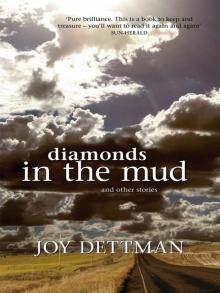 Diamonds in the Mud and Other Stories
Diamonds in the Mud and Other Stories Moth to the Flame
Moth to the Flame The Tying of Threads
The Tying of Threads Wind in the Wires
Wind in the Wires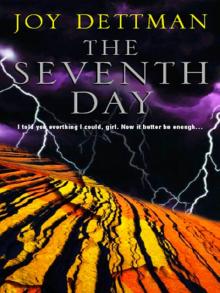 The Seventh Day
The Seventh Day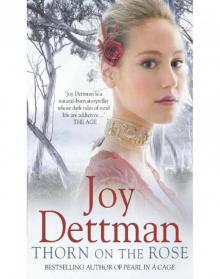 Thorn on the Rose
Thorn on the Rose Jacaranda Blue
Jacaranda Blue Mallawindy
Mallawindy Ripples on a Pond
Ripples on a Pond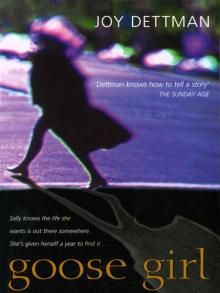 Goose Girl
Goose Girl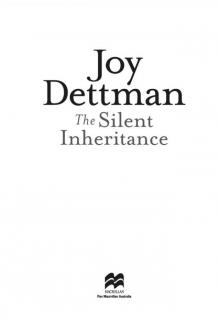 The Silent Inheritance
The Silent Inheritance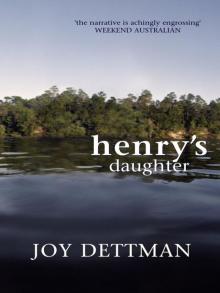 Henry’s Daughter
Henry’s Daughter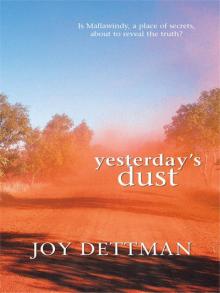 Yesterday's Dust
Yesterday's Dust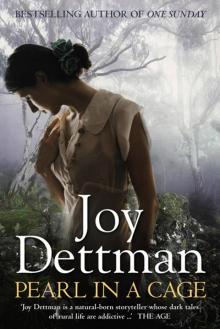 Pearl in a Cage
Pearl in a Cage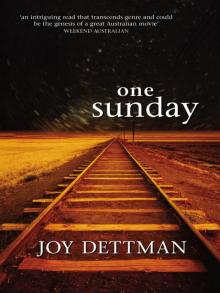 One Sunday
One Sunday